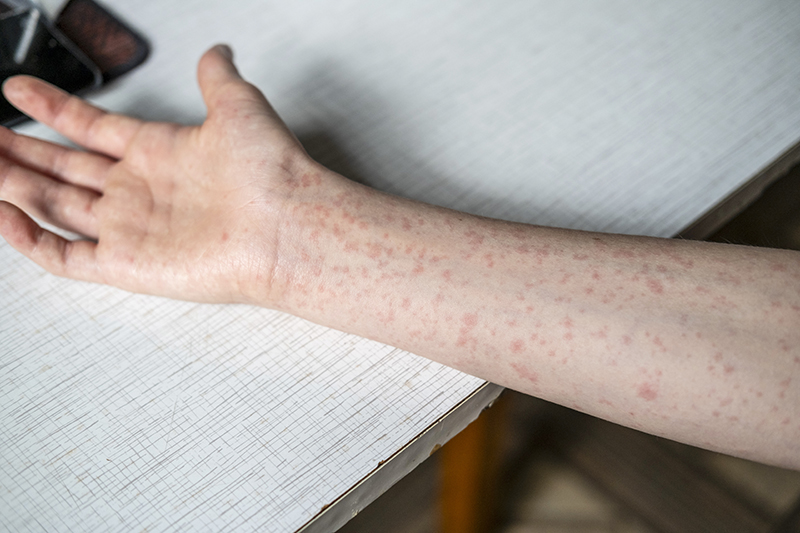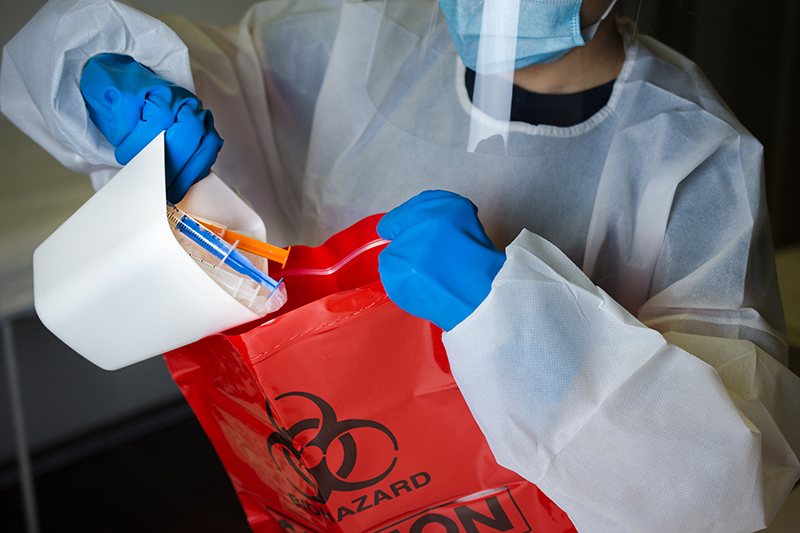
The independent source for health policy research, polling, and news.
VOLUME 21
Public Perception of Measles Vaccines and Unsubstantiated Treatment Claims
Summary
This Monitor shares new findings from the latest KFF Tracking Poll on Health Information and Trust and examines the false promotion of budesonide and clarithromycin for treating measles. It also explores misrepresentations of safe syringe programs and how prompting strategies can improve accuracy of AI chatbots when answering health-related questions.
Featured: Latest KFF Poll Finds More Adults are Encountering False Claims About Measles Vaccine and Many are Uncertain What to Believe
As the U.S. faces rising measles cases across multiple states and the highest number of cases since 2019, the latest KFF Tracking Poll on Health Information and Trust finds that most adults – including most parents – say they have heard at least one of several false claims about measles or the vaccine used to prevent it. About six in ten adults (63%) and a similar share of parents (61%) say they have read or heard the false claim that the measles, mumps, and rubella (MMR) vaccines have been proven to cause autism in children and one in five adults and similar shares of parents (17%) have heard the false claim that vitamin A can prevent measles infections. One in three adults (33%) say they have heard or read the false claim that the measles vaccines are more dangerous than being infected with measles, an increase of 15 percentage points from March 2024.
While fewer than 5% of adults say they think each claim is “definitely true,” less than half identify each as “definitely false.” Consistent with previous KFF polling, most adults express some uncertainty, saying it is either “probably true” or “probably false” that vitamin A can prevent measles infections (70%), that the MMR vaccines have been proven to cause autism in children (62%), or that measles vaccines are more dangerous than measles infections (54%). While at least half of adults express uncertainty, across partisans, Republicans and independents are more likely than Democrats to believe or lean toward believing each false claim about measles, with similar partisan gaps found among parents.
Believing or leaning toward believing false claims about measles and MMR vaccines is associated with whether parents keep their children up to date on recommended vaccines. Among parents who say that at least one of the three false claims about measles is either “definitely” or “probably true,” a quarter (24%) say they have delayed or skipped some vaccines for their children, compared to about one in ten parents (11%) who say each of the three myths are “probably” or “definitely false.” The survey did not measure whether parents have specifically skipped the MMR vaccine for their children.
Recent Developments
Some Health Professionals Use Budesonide and Clarithromycin to Treat Measles Without Evidence
As measles outbreaks continue to spread across the U.S., the measles, mumps, and rubella (MMR) vaccine remains the most effective form of prevention. There is no medical treatment for measles once infection occurs, but ongoing skepticism and misinformation about vaccine safety may discourage some from vaccinating themselves or their children. In some cases, individuals seeking alternatives to vaccination may turn to non-evidence-based treatment methods that can be harmful and may delay necessary clinical care. In Texas, hospitals have reported cases of pediatric patients admitted with both measles and vitamin A toxicity, following online promotion of high-dose vitamin A as a treatment, despite no medical consensus supporting its use.
At the same time, some health care providers in Texas have recently made misleading claims that measles can be effectively treated with budesonide, a steroid typically used for asthma and Crohn’s disease, and clarithromycin, an antibiotic. However, there is no evidence these drugs are effective for measles, and both carry risks. Medical experts, including Dr. Paul Offit of the Children’s Hospital of Philadelphia and Dr. Adam Ratner of the American Academy of Pediatrics, told NBC that steroids like budesonide can suppress the immune system and should not be used early in viral infections like measles. False claims about budesonide’s effectiveness for preventing viral infections have circulated before when it was also wrongly promoted as a treatment for COVID-19. Those claims were based on preliminary research from Oxford that showed a relief of symptoms in mild cases of COVID-19, but did not reduce risk of hospitalization and death. Clarithromycin is also ineffective against viruses and generally not used to treat any secondary bacterial infections that arise from measles, which often require intravenous antibiotics like vancomycin and ceftriaxone. Unnecessary use of broad-spectrum oral antibiotics like clarithromycin may also increase the risk of antibiotic resistance.
The inaccurate claim that budesonide and clarithromycin can treat measles gained further attention after Health and Human Services (HHS) Secretary Robert F. Kennedy Jr. shared a post on X calling physicians who used these drugs to treat measles patients “extraordinary healers.” His post claimed that about 300 children in Texas had been successfully treated with budesonide and clarithromycin, but he later stated that vaccines are the best way to prevent measles. Other anti-vaccine social media users amplified these claims, including a medical doctor with approximately 1.2 million followers on X who shared an article suggesting that budesonide could have prevented the death of a child in Texas.
False Claims Undermine HIV Prevention Efforts in Maine
Misleading claims about syringe service programs (SSPs), or needle exchange programs, may complicate local public health efforts in Maine to contain an ongoing HIV outbreak primarily affecting people who inject drugs and/or are unhoused. Since October 2023, the Maine CDC has reported a total of 23 cases related to an outbreak in Penobscot County, a sharp increase from the county’s average of two new diagnoses per year over the past five years. In response, the agency says it is working with community partners to increase access to HIV and hepatitis C testing, provide HIV and sexually transmitted infection (STI) prevention services such as post-exposure prophylaxis (PEP) and pre-exposure prophylaxis (PrEP), and offer SSPs—community-based initiatives that provide sterile syringes and safe disposal of used ones.
Articles about the outbreak were shared on Facebook and Reddit, where many commenters disparaged SSPs. Some falsely claimed that the programs increase drug use and cause infectious disease outbreaks, despite research showing that they reduce the spread of HIV. Extensive research, including a 2022 systematic review published in International Journal of Drug Policy, found sufficient evidence that SSPs prevent HIV transmission among people who inject drugs. The review also found that SSPs are likely to reduce injection risk behaviors and do not appear to be associated with an increase in injection frequency. Continued misleading claims about the effectiveness of SSPs may undermine support for evidence-based interventions in communities facing stigma and barriers to care.
AI & Emerging Technology
As people turn to AI for health information, the way patients phrase their questions may affect whether they receive accurate answers. A study in JAMIA Open explored how neuro-oncology patients could most effectively use large language models (LLMs) to answer health-related questions when reviewing their doctor’s notes. One study author – a neuro-oncologist – and one of their patients evaluated three widely available LLMs on 8 dimensions, including accuracy and evidence, using questions based on a doctor’s note from a neuro-oncology visit. The chatbots were tested with and without a prompt to act like an expert oncologist, and the questions were presented either in the order that the information appeared in the doctor’s note or in random order. Both the neuro-oncologist and their patient rated the responses highest across all 8 dimensions when the chatbots were instructed to act as an expert oncologist. However, all models scored low in their use of evidence, which may pose risks if people rely on these tools without understanding their limitations. Unlike search engines, LLMs are trained on large datasets and generate responses based on patterns, rather than by directly referencing verifiable sources. Because of these limitations, the study authors note that involving patients in the development of ethical guidelines could help strengthen existing efforts – such as the transparency requirements set by the Assistant Secretary for Technology Policy/Office of the National Coordinator for Health Information Technology’s (ASTP/ONC) AI assurance labs – to better limit AI-generated misinformation.
Support for the Health Information and Trust initiative is provided by the Robert Wood Johnson Foundation (RWJF). The views expressed do not necessarily reflect the views of RWJF and KFF maintains full editorial control over all of its policy analysis, polling, and journalism activities. The Public Good Projects (PGP) provides media monitoring data KFF uses in producing the Monitor.






